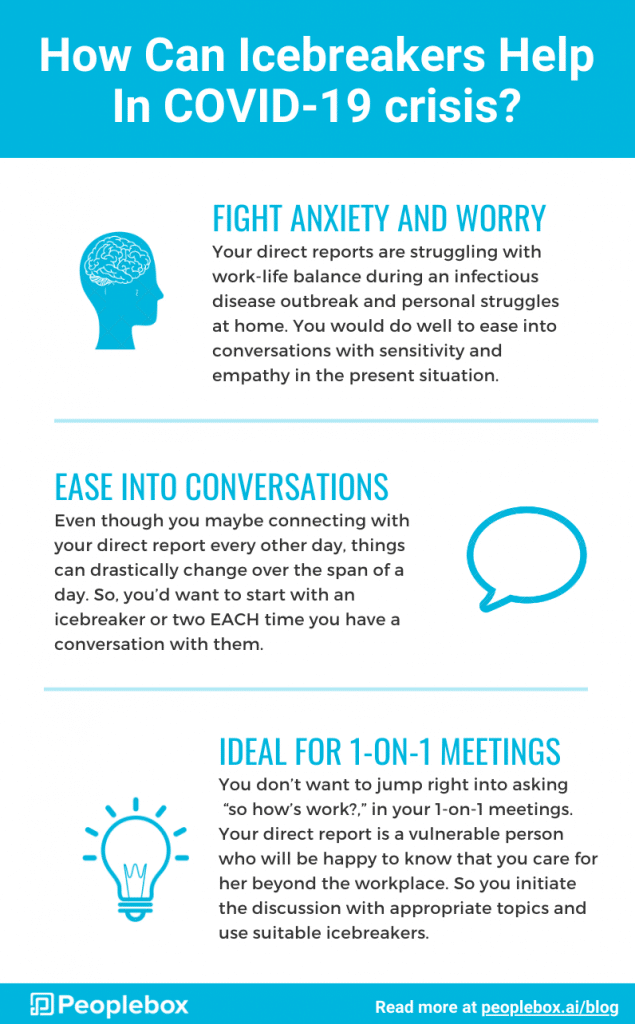Are you reading this from your “home office?” No doubt, your organization has mandated work from home for all employees due to the COVID-19 outbreak.
Chances are that your team, now fully remote, is having a tough time adjusting to this sudden crisis.
They are understandably facing challenges with this new way of working and probably lack proper infrastructure to work effectively.
Saikat Chatterjee, Senior Director, Advisory at Gartner was recently quoted saying, “we’re being forced into the world’s largest work-from-home experiment and, so far, it hasn’t been easy for a lot of organizations to implement.”
How can you be more human in your team interactions?
Did you know that face-to-face interactions are 34 times more effective than emails?
When you’re speaking to someone face-to-face, you can pick up on his body language and various subtle, non-verbal cues, which provide more context to what he is saying.
There is less chance of misinterpretation because gestures can soften one’s language and tone. You can also promptly clarify any miscommunication.
But now there is no physical interaction at all. And it appears that this way of working isn’t going to change anytime soon. How, then, can you be more human when connecting with your direct reports?
The answer is: icebreakers.
Easy to Implement Virtual Coffee Software for Remote Teams
CoffeeConnect automatically connects two people every week based on their interests in slack and helps them build camaraderie easily with ice-breakers questions and rapid-fire quizzes.
ICEBREAKER QUESTIONS EBOOK
Icebreaker questions you can ask in every meeting during the COVID-19 pandemic.
Virtual Games for Remote Teams
CoffeeConnect connects two people every week based on their interests in slack and helps them build camaraderie easily with ice-breakers questions, rapid-fire quizzes and virtual coffee.
So, what are icebreakers really?
Icebreakers are questions or conversations designed to help initiate a discussion or conversation, which could be difficult to start due to factors like unfamiliarity or being exposed to an unexpected situation, like the one we face today.
They are a great way to break down barriers between team members and create a more open and interactive environment.
They are also a fantastic tool to drive engagement, create a sense of belongingness in your team, and make remote meetings, one on ones and others, more effective overall. Your direct reports will not be accustomed to the isolation and distractions of remote work.
With the right icebreakers, you can ease into a conversation comfortably, reducing the climate of fear and quelling anxieties about falling sick and being hospitalized.
Direct reports also become more receptive to what you have to say, especially if you have to communicate difficult decisions.
Find icebreaker games to build great connect with your remote teams HERE!
Icebreakers in times of Covid-19 crisis
Cracking tone-deaf jokes or asking the usual humorous icebreaker questions is meaningless now, and may even be counter-productive.
Your team needs you to step up and lead them with confidence. Now more than ever, they need you to be compassionate and offer them a sense of stability.

TIP: To kick-start remote work collaboration, you can choose from among our list of 21 remote work tools to manage remote teams effectively.
Where can you use icebreaker questions?

You have many opportunities to connect with your team, even if you’re all working remotely.
This means that you can use icebreakers in a number of ways to make it easier to deal with this sudden crisis.
1 Virtual “Water-cooler” Conversations:
Your team may miss the physical proximity they had taken for granted until now.
A close approximation of this informal banter can be virtual conversations held on private channels set up specifically for the purpose on platforms like Slack or Tandem.
You and your team members can discuss personal challenges during this outbreak and exchange tips and tricks to stay safe.
Simply commiserating with another person can boost all-round mental health. Icebreakers can kick-start candid conversations on these channels.
2 One on one meetings:
You want to get the most out of your one on one meetings because it is a private and safe space for your direct reports to speak their minds without fear of causing injury or offence.
Use icebreakers to set the right tone for the meeting. Your direct report is probably overwhelmed by numerous concerns–family, home, food, safety.
An empathetic, reassuring response from you will help lighten his burdens.
Add to it the experience of using a one on one meeting software, and you are all set for an effective one on one meeting.
3 Regular team meetings:
Regular meetings with the team via videoconferencing is a given.
The Corona-virus outbreak did not give organizations time to adequately prepare for large-scale remote work, so it is vital that hurdles are ironed out by connecting frequently.
You’ll consider that it is an anxious time now, and ease into discussions with icebreakers.
4 Happy hours/Friday meets:
We know you can’t actually meet in person on Friday evenings to unwind with your co-workers.
But why let it stop you from having a virtual meeting?
Remote work is by nature isolating, and it is easy to feel lonely and disconnected from the team and company.
Use icebreakers to turn these “Virtual Fridays” into the comfortable space that your team needs to let their hair down.
TIP: Virtual games are good icebreaker games, in ordinary circumstances. But in stressful times, they may not have the effect you want. You don’t want to drag people into meaningless games for fun when they’re already stretched thin between managing their homes and getting office work done.
Easy to Implement Virtual Coffee Software for Remote Teams
CoffeeConnect automatically connects two people every week based on their interests in slack and helps them build camaraderie easily with ice-breakers questions and rapid-fire quizzes.
ICEBREAKER QUESTIONS EBOOK
Icebreaker questions you can ask in every meeting during the COVID-19 pandemic.
Virtual Games for Remote Teams
CoffeeConnect connects two people every week based on their interests in slack and helps them build camaraderie easily with ice-breakers questions, rapid-fire quizzes and virtual coffee.
Bonus: Questions that can be asked as icebreakers
We’ve compiled a few icebreaker questions to help you keep the momentum going during the Covid-19 crisis. Take a look:
- How are you doing? How is your family coping up?
- Hope all is well in your vicinity as well. How are your friends doing?
- How are you coping with the situation? Do you need any kind of support from me?
- Do you have all the essentials (water & groceries) in place?
- Are you able to spend time with your family?
- How are you managing household chores and working together?
- Do you have a dedicated place to work from home?
- Is there anything you need to build a better work setup at home?
- Do you follow an exercise routine at home?
- How do you unwind or take a break in between or after work hours?
- Do you feel relaxed or stressed while working from home?
- Now that you save on your commute time, how do you spend that time?
- Any suggestions about how we can improve work processes in the current scenario?
- Do you think too much information from media reports is benefiting you or harming you?
- Is it unusual to have no fear in the current situation?
- What do you do when you find yourself caught in a fix?
- Do you feel anxious because of the current situation? How do you deal with anxieties?
- Should we express all our feelings, or just the good ones at this point?
- Did you or your close ones get affected by this travel ban?
- What do you feel about the government’s preparedness to deal with the crisis?
- What do you think is the future of work after this crisis is over?
Find meeting specific icebreaker questions HERE!
TIP: Don’t forget to take a cue from our exhaustive list of icebreaker questions, among 500+ questions you can ask during one on one meetings.
Conclusion
As a leader, you want to confidently navigate the COVID-19 crisis and not lose sight of your human side.
The physical and emotional well-being of your direct reports is your first priority.
Crisis situations provide many opportunities to strengthen your relationship with your team.
This boosts the company’s future business prospects and also boosts employee morale.
So, hang in there and stay safe!
Easy to Implement Virtual Coffee Software for Remote Teams
CoffeeConnect automatically connects two people every week based on their interests in slack and helps them build camaraderie easily with ice-breakers questions and rapid-fire quizzes.
ICEBREAKER QUESTIONS EBOOK
Icebreaker questions you can ask in every meeting during the COVID-19 pandemic.
Virtual Games for Remote Teams
CoffeeConnect connects two people every week based on their interests in slack and helps them build camaraderie easily with ice-breakers questions, rapid-fire quizzes and virtual coffee.







